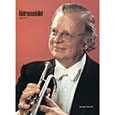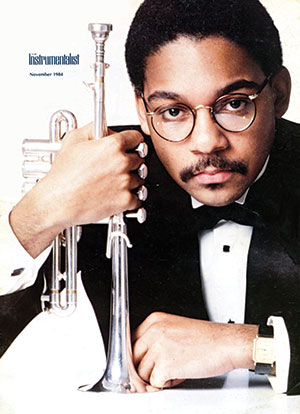 When Clifton Williams won the first Ostwald competition in 1956 for Fanfare and Allegro, band music was getting exciting. Williams promoted band music with a missionary zeal. At his annual Southwestern Symposium at the University of Texas, he would alternate bringing in Vincent Persichetti and Paul Creston because they were the major composers with true band interest in those days. John Barnes Chance and I were students at the University of Texas during that time, and we wrote mainly for orchestra. Williams convinced us, and I should include Larry Weiner, of the necessity of writing for band.
When Clifton Williams won the first Ostwald competition in 1956 for Fanfare and Allegro, band music was getting exciting. Williams promoted band music with a missionary zeal. At his annual Southwestern Symposium at the University of Texas, he would alternate bringing in Vincent Persichetti and Paul Creston because they were the major composers with true band interest in those days. John Barnes Chance and I were students at the University of Texas during that time, and we wrote mainly for orchestra. Williams convinced us, and I should include Larry Weiner, of the necessity of writing for band.
W. Francis McBeth, 1991
With my brass quintet, which includes members of the Chicago Symphony, we regularly rehearse pieces we have played our whole lives at half-tempo or even slower. At this speed, nothing is difficult, and nothing is technical, so we can relax and hear every interval, every interplay amongst the group, and fix every single detail. It is easy to open your ears and be able to hear everything when you are not worried and everything is calm and slow. It also helps identify what needs fixing in each of our individual parts.
Barbara Butler, 2010
The director of the small band is continually trying to reach for an instrumentation which he rarely achieves. It is a most discouraging situation for the serious bandsman. The small band deserves a special instrumentation which is designed to fit. A professional band sounds fine with a small number of players, even though there may be only one player to a part or one player to an instrument. With student band this is not practical. The number of parts and different instruments must often be limited.
Traugott Rohner, 1952
You can get through a traditional piece without knowing anything about how a composer composes, but to play something reasonable in an aleatoric piece, a student has to listen differently, not to hear if he’s in tune but to know if what he plays relates to the rest of the composition. Involving students in avant-garde music makes them aware of a musical composition in ways that performing traditional pieces does not.
Frank Battisti, 1990
To be a good band director, first of all you have to like people, be able to see the best in them, and know how to bring it out. I don’t care if you have memorized every score ever written, and can analyze every technical detail. A tremendous wealth of knowledge and musicianship is important; but there are lesser musicians lacking in that knowledge who do a great job just because they have the ability to inspire others.
Col. Arnald Gabriel, 1981
Another option as students enter the class is solfege practice. Beginning teachers often do not do this and are uncomfortable singing in front of a group. I did not figure out how valuable it is until I had been teaching for a long time. Find a groove CD with a rhythm and a pitch, and as students enter practice with call and response. The director sings, and students sing it back. Once everybody is in their seats, the teacher plays a line, and students play it back. The director could also sing, and they respond on their instruments. From the moment students come into the room, they are involved.
Mary Land, 2012
From the earliest days I can remember I was interested in music. No one ever forced me, it was just a part of what was good in life….We never had a lot of money…but there was always money for music.
John Paynter, 1979
Musical rehearsals must be fun. When I was a young director, John Paynter told me that students come to us with different perceptions of fun. He said some students enjoy reading War and Peace, and some enjoy a walk in the park. He said it was our job as conductors to help students perceive fun the way we perceive it.
Alfred Watkins, 2017
Why should you want to be a composer? You have to want to write music, that is all. There is no assurance that you will write wonderful stuff or earn a living.
Vincent Persichetti, 1985
Don’t believe that there are rules when they contradict your best imagination…. Studying books can be useful if you know when to throw the book away.
Erich Leinsdorf, 1985
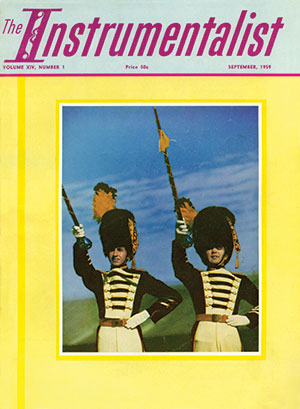 I always teach rhythm with drumsticks in my hands. My clarinet teacher at Juilliard said that every minute you practice without a metronome is a minute wasted, and that has stuck with me for 30 years. Pulse holds the group together, so I constantly keep tempo and pulse in their minds. I use drumsticks because I’ve broken so many batons by banging them on the stand. After a while, the students settle into the rhythm and make that their responsibility. Rarely do the groups here lose tempo.
I always teach rhythm with drumsticks in my hands. My clarinet teacher at Juilliard said that every minute you practice without a metronome is a minute wasted, and that has stuck with me for 30 years. Pulse holds the group together, so I constantly keep tempo and pulse in their minds. I use drumsticks because I’ve broken so many batons by banging them on the stand. After a while, the students settle into the rhythm and make that their responsibility. Rarely do the groups here lose tempo.
Bruce Dinkins, May 2011
When I face the score paper, I light up. I know immediately what to do. However, before I get to the composing act itself, I spend a tremendous amount of time planning the smallest details of the composition in my mind. I sweat. I woodshed things. I agonize.
Morton Gould, 1978
It’s a great joy to finally do a concert conducting a piece of one’s own. It’s as close as you can come to doing it the way you want it. I don’t mean to say Leonard Bernstein can’t do a work better than I can; however, he still adds his little bit.
Aaron Copland, 1979
You know, every instrument is in a sense an attempt by man to imitate the human voice in some way – and basically that’s the ultimate goal that everybody should have in mind when they play an instrument. When you play some of the very disjointed things, especially in some of the avant-garde pieces, it’s rather hard to think in terms of vocal lyricism. But nevertheless, it still helps your playing…more phrase-wise, with a better sound, a better projection of the idea – grotesque as it might be. I think that every instrumentalist can benefit greatly from listening to fine singers, especially opera or lieder where they are telling a story. And you can learn a lot listening to a great pop singer like Frank Sinatra. The guy really puts across the lyrics of a tune.
Bud Herseth, 1977
I’m not sure that anybody within our brass section consciously says, “Aha, there is a Chicago sound and that’s what I must match.” I like to think that there are many different Chicago Symphony brass sounds, depending on what we’re playing, who the conductor is, and what they ask for. I certainly don’t play with one sound. I know you don’t mean one sound but a generalized kind of sound that is instantly recognizable as the Chicago Symphony. If I had to say in one word why it is that way, it would be Herseth. That’s the long and short of it right there.
Dale Clevenger, 1990
When I first started teaching I learned so much from Raymond Sutherland. Every afternoon after school we went someplace to talk, and these conversations were probably the best education I had. When I studied composition with Jared Spears and as I pulled weeds in his yard, he stood and talked about the music business. At these times, I learned more than I ever did while he looked over a composition I had written.
Quincy Hilliard, 2005
Everybody has some kind of problem in his life, and I think to be unkind to people only causes negative results. We have to work for as many positive results as we can because in music we are dealing with human emotions. Musicians first get wrapped up in music because it is so emotional, but some directors become so demanding that they forget they are dealing with human beings.
Claude T. Smith, 1987
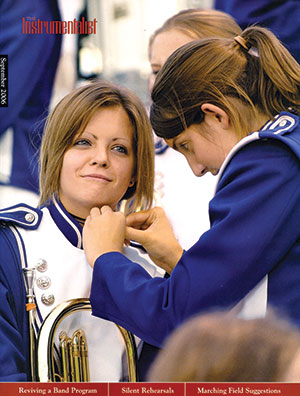 People don’t win auditions or land jobs because of their weaknesses; they are hired for their strengths. Everyone has a closet full of weaknesses, to be opened when no one else is around, and each should take the time to turn them into strengths. I don’t want students to become artistic robots, but human beings who are aware of their own strengths, weaknesses, and the needs of others.
People don’t win auditions or land jobs because of their weaknesses; they are hired for their strengths. Everyone has a closet full of weaknesses, to be opened when no one else is around, and each should take the time to turn them into strengths. I don’t want students to become artistic robots, but human beings who are aware of their own strengths, weaknesses, and the needs of others.
Harvey Phillips, 1991
I believe the band room should be the safest, happiest room in the school, a place where bad things don’t happen…. I believe the band director should set an example by being a positive, happy person who changes the way students feel about themselves, school, and the band program. I want there to be a feeling of community, that the band members take care of and watch out for each other.
Freddy Martin, 2008
Never play favorites, and as much as possible, avoid directing attention to any one person or group on the field. Consistency of methods and demands will let members know exactly where they stand and will avoid the embarrassment of special cases.
John Paynter, 1959
To say that Sousa was a master showman would be an understatement. He learned the value of showmanship to stage performers as a youth while playing violin in Washington and Philadelphia theater orchestras. There he made keen observations about the music which the general public enjoyed. From that time on, he made it his business to play music to which the masses would respond, and he was eminently successful. He discovered that bands, which were relatively unhampered by tradition, had the potential for reaching more people than orchestras.
Paul Bierley, 1973
Always be open minded, withhold judgments, and remember that someone else may have a better idea. Seek as much knowledge and information as possible…. The process of gaining knowledge should not end with college. All of us have to read, go to concerts, ask questions, and listen for the rest of our lives if we want to be successful.
Garwood Whaley, 2000
I try to compose every day I am at home, even when I don’t feel like it, because it is important to be diligent. As Picasso said, “inspiration exists, but it has to find us working.”
Jennifer Higdon, 2018
Dynamics are the secret. A band that plays loud from beginning to end with electric sounds blaring just doesn’t make it. Listen to Basie and not just my arrangements. Basie whispers, and then when he plays loud, he explodes. If you play my music with an attention to dynamics, it will sound better.
Sammy Nestico, 1979
Tempo and dynamics are the first two elements that a conductor must deal with in his approach to any composition. This, then, is the very general answer that I would give when asked how my music should be performed: choose the tempo in which the players are able to execute all the notes with all expressive markings; if the chosen tempo is either slower or faster than indicated in the score, compensate with dynamics by overemphasizing all expressive markings in fast movements, and deemphasizing slightly in slow movements. Whatever the situation, a logical relation between tempo and dynamics must be maintained.
Vaclav Nelhybel, 1974
I always practice. The least I do is an hour a day somehow or other. Of course you must remember that you need a certain amount of endurance to play the clarinet, and I don’t have as much now as when I was 35. The first time I played a classical concert I played both the Mozart Concerto and the Debussy Rhapsody – both works on a single concert. And I used to practice the Bartok Contrasts in between five shows a day at the Paramount. Well I can’t do that now, let alone play five shows.
Benny Goodman, 1979
Become completely immersed in the musical and aesthetic atmosphere created by other conductors; it can be more beneficial than being able to list ten new specific rehearsal techniques picked up from them.
H. Robert Reynolds 1980
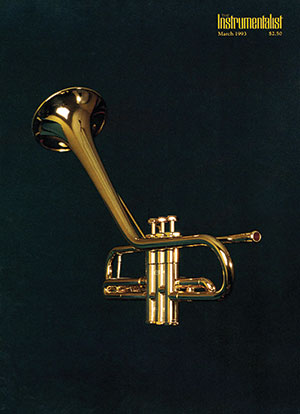 For me sound is always first. If the sound is not characteristic of the instrument, it does not matter how fast your fingers can move or how high you can play, because nobody is going to want to listen. This is a daily concern and can be improved with long tones, interval studies, and exercises to match registers. It is what we are taught when we are young, and it is the same stuff you hear members of a symphony doing when they are preparing to play. They are listening to intervals, they are matching, and they are thinking about sound and air. Arnold Jacobs did it with brass players, but it is just as important for woodwind players.
For me sound is always first. If the sound is not characteristic of the instrument, it does not matter how fast your fingers can move or how high you can play, because nobody is going to want to listen. This is a daily concern and can be improved with long tones, interval studies, and exercises to match registers. It is what we are taught when we are young, and it is the same stuff you hear members of a symphony doing when they are preparing to play. They are listening to intervals, they are matching, and they are thinking about sound and air. Arnold Jacobs did it with brass players, but it is just as important for woodwind players.
Eugene Migliaro Corporon, 2014
Conducting cannot be taught. My suggestion would be to learn by observing conductors and see how they work, and then pave your own way. For conductors, it’s all about understanding the dynamic of creating an interpretation with others. It is not about the gesture; it’s about inspiring and connecting with the orchestra.
I am growing every day with every composition I conduct. Conducting is a journey, not an endpoint. Every time I conduct a piece I have conducted before I learn something new and different about the piece and myself. I used to say, “How do I conduct that piece?” Now I say, “Why do I conduct it?”
Gustavo Dudamel, 2019
Teach students to know that this is their country and to love it, that the musical life of it is their responsibility as well as yours: help them to know that music has always led a struggling existence but that it survives in spite of everything. Lead them out of the silent valleys of statistics into the hills of great sound wherein the love, character, and talent of musical educators in the millennium before them have erected for all the world the incredibly beautiful temple of the art of music.
Frederick Fennell, 1957
Use the next to last rehearsal before a concert to videotape your podium technique. This way small faults can be observed, corrected, and practiced with the group before the concert. Don’t attempt this on the final rehearsal because a change of conducting technique at the concert itself may confuse performers.
Frank Wickes, 1978
Some students would never get through school if it had not been for band. Band was their safe place. Band was their home. Band made everything else tolerable. I look at my current band, and I know there are students in it who succeeded in academics because band got them through the tough times.
Heidi Sarver, 2013
